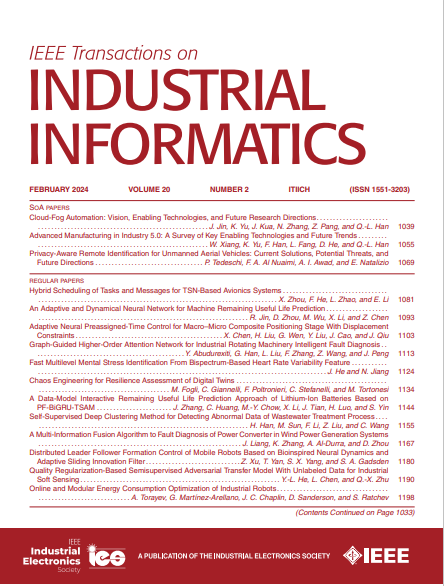A Novel State-of-Charge Estimation Method for Lithium-Ion Battery Using GDAformer and Online Correction
IF 9.9
1区 计算机科学
Q1 AUTOMATION & CONTROL SYSTEMS
引用次数: 0
Abstract
Lithium-ion batteries have been developed as the most widely used energy storage equipment and power batteries. State-of-charge (SOC) of the battery is a key index to evaluate the remaining range of electric vehicles. The existing SOC estimation methods perform unsatisfactorily on the multivariate long-time series data produced by battery operation. In this article, a graph deviation-based autoformer is proposed to realize accurate SOC estimation. The GD-based input module utilizes the graph structure with embedding vectors to extract spatial features and detect outliers. Encoder and decoder can acquire the temporal cycle dependencies in the data, using sequence decomposition block and auto-correlation mechanism instead of self-attention mechanism. Meanwhile, the online detection method can filter out noise and fluctuations to enhance the accuracy and robustness of the estimation results. The average values of normalized root mean square error, normalized mean absolute error, and使用 GDAformer 和在线校正的新型锂离子电池充电状态估计方法
锂离子电池已发展成为应用最广泛的储能设备和动力电池。电池的充电状态(SOC)是评估电动汽车剩余续航里程的关键指标。现有的 SOC 估算方法在处理电池运行产生的多变量长时间序列数据时效果并不理想。本文提出了一种基于图形偏差的自动变形器,以实现精确的 SOC 估算。基于图偏差的输入模块利用带有嵌入向量的图结构来提取空间特征和检测异常值。编码器和解码器可以获取数据中的时间周期依赖关系,使用序列分解块和自动相关机制代替自注意机制。同时,在线检测方法可以过滤噪声和波动,从而提高估计结果的准确性和鲁棒性。实验得出的归一化均方根误差、归一化均值绝对误差和 R2 的平均值分别为 0.0057、0.0042 和 0.9995,这表明与其他先进方法相比,该方法在 SOC 估计方面具有更优越的性能。该方法对新的驾驶模式和新的温度也有很好的泛化能力,显示了在实际应用中的巨大潜力。
本文章由计算机程序翻译,如有差异,请以英文原文为准。
求助全文
约1分钟内获得全文
求助全文
来源期刊

IEEE Transactions on Industrial Informatics
工程技术-工程:工业
CiteScore
24.10
自引率
8.90%
发文量
1202
审稿时长
5.1 months
期刊介绍:
The IEEE Transactions on Industrial Informatics is a multidisciplinary journal dedicated to publishing technical papers that connect theory with practical applications of informatics in industrial settings. It focuses on the utilization of information in intelligent, distributed, and agile industrial automation and control systems. The scope includes topics such as knowledge-based and AI-enhanced automation, intelligent computer control systems, flexible and collaborative manufacturing, industrial informatics in software-defined vehicles and robotics, computer vision, industrial cyber-physical and industrial IoT systems, real-time and networked embedded systems, security in industrial processes, industrial communications, systems interoperability, and human-machine interaction.
 求助内容:
求助内容: 应助结果提醒方式:
应助结果提醒方式:


